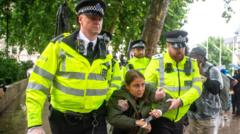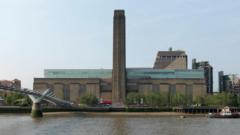Why is the UN Human Rights Chief Criticizing the UK's Ban on Palestine Action?

The Implications of the UK Government's Ban on Palestine Action
The recent decision by the UK government to ban Palestine Action has raised significant concerns among human rights advocates and international observers. The United Nations' high commissioner for human rights, Volker Turk, has labeled the ban as a "disturbing" misuse of counter-terrorism legislation, arguing that it imposes disproportionate restrictions on freedoms of expression and assembly. This article delves into the ramifications of this ban, the underlying motivations, and the broader implications for human rights in the UK.
The Context of the Ban
Palestine Action, a group advocating for Palestinian rights, was designated as a terrorist organization under the Terrorism Act 2000 following a series of high-profile protests, including the vandalism of military aircraft. This designation allows for severe penalties, including imprisonment of up to 14 years for membership or support of the group. The legal challenges against the ban highlight a growing tension between governmental authority and civil liberties in the UK.
Understanding Counter-Terrorism Legislation
The UK's counter-terrorism legislation, particularly the Terrorism Act 2000, was designed to combat violent extremism and ensure national security. However, critics argue that its broad definitions can lead to unintended consequences, such as the criminalization of peaceful protest and dissent. Turk’s comments underscore the need for a balanced approach that protects national security while safeguarding individual rights.
Concerns Raised by the United Nations
Volker Turk has expressed that the ban on Palestine Action is disproportionate and unnecessary, particularly for individuals who support the group without engaging in criminal activities. He emphasizes that restricting the rights to freedom of expression and assembly contradicts the UK’s obligations under international human rights law. This perspective suggests that a reevaluation of how such laws are applied is necessary to prevent overreach and abuse.
The Impact of the Ban
Since the implementation of the ban, over 170 arrests have been made, illustrating a swift and aggressive enforcement of the new regulations. The implications extend beyond those directly involved with Palestine Action, affecting a broader community of activists and supporters. The chilling effect on free speech and the potential for self-censorship are significant concerns for civil liberties in the UK.
Legal Challenges Ahead
The legal challenges against the ban are set to unfold in the High Court, with a judgment expected soon. The outcome of these proceedings could have far-reaching implications for how the UK government applies counter-terrorism laws and manages dissent. Activists and legal experts are watching closely, as this case could set a precedent for future applications of similar laws.
The Broader Implications for Human Rights
Turk's criticism of the UK's broad definition of terrorism raises questions about the alignment of national laws with international human rights standards. The UN high commissioner argues that terrorism should be strictly defined to include acts intended to cause death or serious injury, rather than extending to property damage. This calls for a reevaluation of what constitutes 'terrorism' in legal frameworks globally.
Palestine Action’s Activities and Objectives
Palestine Action has primarily focused on disrupting the operations of arms companies that it accuses of facilitating violence in the Israeli-Palestinian conflict. The group's actions are framed as a form of direct action against entities they believe are complicit in human rights violations. Understanding the motivations behind such activism is crucial in comprehending the complexities of the current geopolitical landscape.
Public Response and Activism
The public response to the ban has been mixed, with some supporting the government's stance on national security, while others view it as an infringement on civil liberties. Activism has surged in response to the ban, with protests and demonstrations advocating for the rights of Palestine Action supporters and calling for a reevaluation of the UK’s approach to dissent and protest.
The Future of Activism in the UK
The implications of the ban on Palestine Action extend into the future of activism in the UK. As laws become increasingly restrictive, the question arises: how will activists adapt? The potential for government overreach could lead to a more cautious public, or conversely, it may inspire a stronger, more resilient movement against perceived injustices.
Conclusion: A Call for Reflection
The situation surrounding the ban on Palestine Action invites a broader reflection on the balance between national security and individual rights. As the legal challenges progress and public discourse evolves, it is essential to consider the implications of such actions on freedom of expression and the right to protest. The UK faces a critical juncture in how it navigates these complex issues while adhering to its international human rights commitments.
FAQs
What is Palestine Action?
Palestine Action is a group that advocates for Palestinian rights, often engaging in direct action against arms companies that support military operations in Israel.
Why was Palestine Action banned by the UK government?
The UK government banned Palestine Action under the Terrorism Act 2000 after the group claimed responsibility for vandalizing military aircraft, which they argue are used to support the Israeli military.
What are the potential consequences of the ban on Palestine Action?
The ban criminalizes membership and support for the group, leading to severe penalties, including lengthy prison sentences. It also has broader implications for civil liberties and the right to protest in the UK.
How is the international community responding to the ban?
The United Nations has criticized the ban as disproportionate and unnecessary, warning that it could infringe on fundamental human rights, including freedom of expression and assembly.
What can we expect from the legal challenges against the ban?
Legal challenges are currently underway in the High Court, with a judgment expected soon. The outcome could set a significant precedent for the application of counter-terrorism laws in the UK.
As we navigate these complex issues surrounding activism and government regulation, how will we ensure that the rights of individuals are protected while addressing national security concerns? #PalestineAction #HumanRights #CounterTerrorism
```Published: 2025-07-25 13:32:02 | Category: sport



